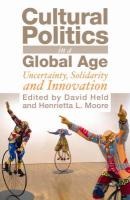Does globalization entail the end of cultural identity ¿ an inevitable homogenization? Or could culture itself be the driving force for change, shaping the face of globalization, its new forms of identity, network, cohesion, and co-operation?
With contributions from Amartya Sen, Will Hutton, Homi Bhabha, Kwame Anthony Appiah, and Jürgen Habermas, among others, this compendium of some of the world¿s most prominent and diverse thinkers gathers together a broad range of answers to the question, `What is the future of culture in the age of globalization?¿
From the perspectives of academia, international relations, business, economics, policy making, cultural institutions, artists, and their audiences, these diverse essays represent a major theoretical and methodological challenge to the social sciences, and raise questions about the nature of globalization and the culture of change. About the authors: Henrietta L. Moore is Professor of Social Anthropology and Director of the Culture and Globalization Programme, Centre for Global Governance at the London School of Economics. She is the author of a number of books, including The Subject of Anthropology, and The Future of Anthropological Knowledge.
David Held is Graham Wallas Professor of Political Science and co-Director of the Centre for the Study of Global Governance at the London School of Economics. He has edited, written and co-authored over a dozen books including A Globalizing World?, Models of Democracy, and Globalization and Anti-Globalization.

